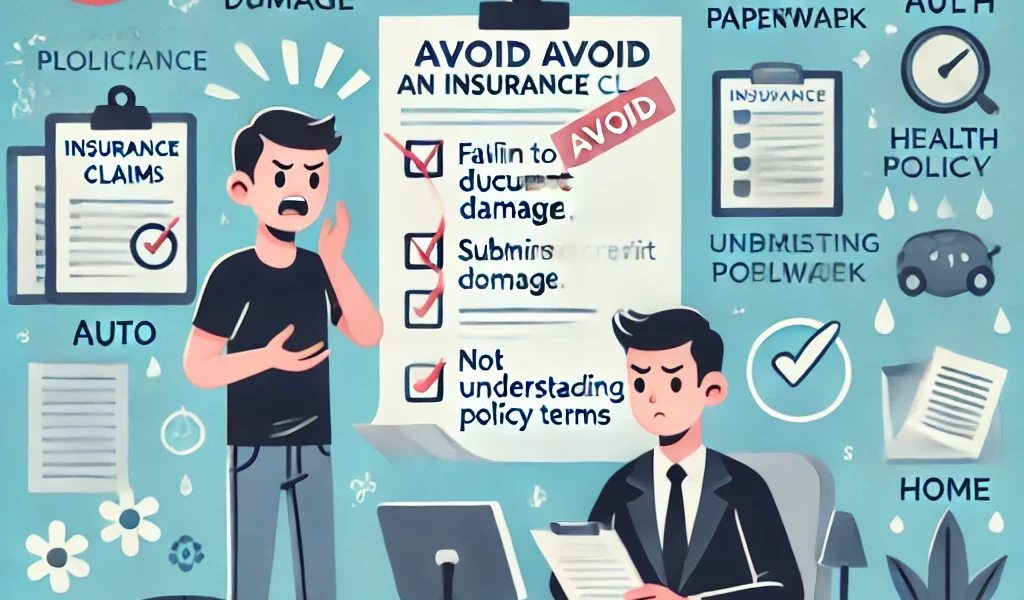Introduction
Filing an insurance claim is essential when you experience a loss due to an accident, disaster, or medical emergency. However, many policyholders unknowingly make mistakes that delay or even lead to claim denials. This guide will walk you through common mistakes to avoid when filing an insurance claim, helping you navigate the process smoothly and maximize your payout.
1. Not Understanding Your Policy
Why It’s a Mistake:
Many claimants assume their policy covers everything, only to be disappointed when their claim is denied. Every insurance policy has exclusions, limits, and specific conditions for coverage.
How to Avoid It:
- Read your policy thoroughly before filing a claim.
- Clarify doubts with your insurer or agent.
- Be aware of deductibles and coverage limits.
2. Delaying the Claim Filing Process
Why It’s a Mistake:
Insurance companies require claims to be filed within a specific time frame. A delay can lead to denial or reduced payouts.
How to Avoid It:
- Report the claim as soon as possible.
- Keep emergency contacts for your insurer handy.
- Gather necessary documents quickly.
3. Failing to Document the Damage Properly
Why It’s a Mistake:
Insufficient documentation can weaken your claim and lead to disputes over compensation.
How to Avoid It:
- Take clear photos and videos immediately after the incident.
- Keep records of damages, receipts, and repair estimates.
- Maintain a log of all communications with the insurance company.
4. Not Providing Accurate Information
Why It’s a Mistake:
Providing incorrect or incomplete information can slow down your claim or result in rejection.
How to Avoid It:
- Double-check all details before submitting forms.
- Ensure medical and police reports are accurate.
- Be honest about the extent of the damage.
5. Failing to Mitigate Further Damage
Why It’s a Mistake:
If you don’t take steps to prevent additional damage, your claim may be partially or fully denied.
How to Avoid It:
- Perform temporary repairs (e.g., covering a broken window, stopping a leak).
- Keep receipts for any emergency repairs.
- Follow insurer recommendations for protecting property.
6. Not Keeping Copies of All Correspondence
Why It’s a Mistake:
A lack of records can make it difficult to resolve disputes if the insurance company questions your claim.
How to Avoid It:
- Save emails, letters, and call logs with the insurer.
- Store digital and physical copies of all claim-related documents.
- Keep notes on conversations with insurance representatives.
7. Accepting the First Offer Without Review
Why It’s a Mistake:
Insurance companies often start with a lower settlement offer, expecting negotiation.
How to Avoid It:
- Review the offer carefully and compare it with repair estimates.
- Consult a claims adjuster or legal expert if needed.
- Negotiate with supporting evidence.
8. Not Seeking Professional Help When Needed
Why It’s a Mistake:
Handling a complicated claim alone can lead to underpayment or delays.
How to Avoid It:
- If the claim is high-value, consider hiring a public adjuster.
- Seek legal advice if the insurer is unfairly denying your claim.
- Consult an independent expert for a second opinion on damages.
9. Misrepresenting or Exaggerating Claims
Why It’s a Mistake:
Exaggerating damages or submitting false claims is insurance fraud, leading to claim denial and legal consequences.
How to Avoid It:
- Always provide truthful and accurate details.
- If unsure about an estimate, get a professional assessment.
- Understand that insurers have fraud detection mechanisms.
10. Not Following Up on Your Claim
Why It’s a Mistake:
A lack of follow-up can result in unnecessary delays and missing critical deadlines.
How to Avoid It:
- Regularly check the status of your claim.
- Keep track of deadlines and required submissions.
- Escalate the matter if your claim is taking too long.
Conclusion
Filing an insurance claim correctly is crucial to receiving fair compensation. By avoiding these common mistakes—such as delaying the claim, providing incomplete documentation, and misrepresenting facts—you increase the chances of a smooth and successful claim process. Always stay informed, communicate effectively with your insurer, and seek professional help when necessary to protect your financial interests.




